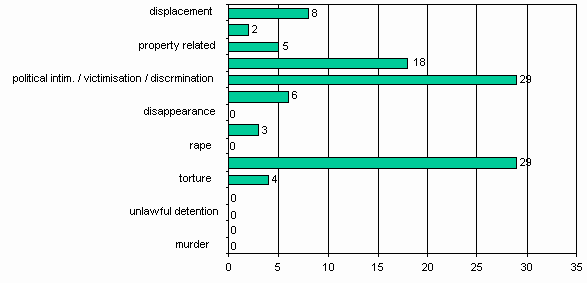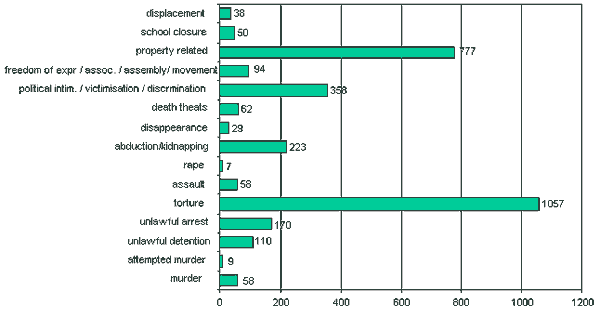|
Back to Index
Political
Violence Report: October 2002
Executive Summary
Zimbabwe Human
Rights NGO Forum
November 21, 2002
For a copy of
the full report, email zimelectionchallenges@yahoo.com
Overview
Reports
of organised violence have consistently surrounded the period preceding
elections in Zimbabwe. The by-election held in Insiza over the weekend
of 26 - 27 October 2002 proved to be no exception as it was allegedly
marked by violence and engulfed in intimidation. There were reports
of victimization of villagers, real and perceived MDC supporters
as well as the MDC candidate himself. In one case, it is alleged
when Zanu
PF candidate, Andrew Langa, is alleged to have fired a shot at an
MDC supporter, Darlington Kadengu, during the campaign period. Siyabonga
Mlandu Ncube, the MDC candidate was with Kadengu at the time of
the shooting. It is unknown whether the shot that hit Kadengu had
been intended for him or not.
The reported
presence of CIO officers and youths from the Border Gezi National
Service Training Centre observing and monitoring the polls in a
breach of the electoral laws, was purported to have had an intimidatory
effect on the opposition party supporters. As the Electoral Act
Section 14B states, it is only those nominated by and accredited
by the Observers’ Accreditation Committee before the actual commencement
of the polls, and those who also have proof of an accreditation
certificate, who are empowered to observe polls; neither of these
groups had been accredited.
There were allegations
that the police were selective in application of the law as they
reportedly targeted only MDC supporters, turning a blind eye to
political violence perpetrated by Zanu PF supporters. In one incident,
Siyabonga Malandu Ncube claimed that police officers stopped their
MDC convoy while on their way from refueling in Gwanda, searched
them, and told them that they were no longer allowed in the area
until after the elections. The police also reportedly barred MDC
party’s election campaign manager from Insiza, Mr. Charles Mpofu,
on allegations of having incited violence. Mr. Paul Themba Nyathi,
director for MDC New Developments, claimed that the police had received
instructions not to let MDC vehicles into the constituency but to
give Zanu PF vehicles unlimited access. As such, these reports of
police brutality and victimization would have led MDC supporters
to fear to vote for their party.
Retributive
attacks on opposition party supporters have been widely reported
in the post – election period for the September 2002 Rural District
Council elections. Anderson Chingosho, MDC candidate in the Mount
Darwin town council elections, was allegedly assaulted and barred
from his home area together with his family. In a related incident,
Nkanyiso Nkala of Gwanda as well as MDC winning candidate in the
rural district and council elections, was reportedly harassed and
forced to defect to Zanu PF.
Cases of farm
evictions have decreased by 37.5% in comparison to those recorded
in the month of September. However, Zana Nance Van Rensburg, the
owner of Monderwa Farm, receiving a one - day notice to vacate the
premises after having stayed at the farm for thirty - seven years.
In another related incident, Zanu PF supporters, led by the war
veterans, reportedly approached Noel Buchanan at Ntshonalanga farm
at midnight and torched his thatched buildings in order to force
him and his workers away.
With people
facing hunger in most parts of the country, Zanu PF supporters have
reportedly taken advantage of this to sway the electorate to its
side as well as punish the would be supporters of the MDC. In Chimanimani,
Zanu PF supporters were allegedly caught red handed rewarding voters
with allocations of maize, moments after they cast their votes in
the just ended September 2002 rural district council elections.
It was reportedly established that after the persons in a queue
for the illiterate were assisted to vote, they would get a handout
of maize from the stock of food1.
This resulted in even the literate people joining this queue so
that they could at least get a bag of maize. On the other hand,
one Kamusoko, an MDC supporter and resident of Svosve Communal Lands,
was allegedly denied access to food aid on allegations of supporting
the "wrong party". Zanu PF offices in Tshabalala, Bulawayo,
have reportedly turned into stockists of the hard to find maize
meal, but it is claimed that the maize meal is only being sold to
Zanu PF cardholders.
Cases of political
intimidation decreased by 65% in comparison to those reported in
September, while cases of infringement of freedom of expression,
assembly and association increased by 78%. Reports indicate that
Zanu PF remained the main instigator of politically motivated violence
in the month of October, with the opposition party MDC being responsible
for only 9.6% of the cases of violence.
Schoolteachers
were reportedly attacked on the basis of their being perceived as
opposition supporters. Teachers who went on a strike organised by
the Progressive Teachers Union of Zimbabwe (PTUZ) were reportedly
dismissed from their posts. In contrast Health Professionals and
University Lecturers who went on strike were neither victimised
nor dismissed. Other incidents of victimisation of teachers were
reported in Gwanda, Beitbridge and Insiza. War veterans reportedly
chased away about ten teachers from five schools in Gwanda and three
nurses from Umzimumi Clinic for ostensibly supporting the MDC. In
Beitbridge, Sithembinkosi Mthombeni, the Head of Msame Primary School,
was allegedly forced off the school premises by seven war veterans
on allegations of being an MDC sympathiser. Raymond Manjongwe, the
Secretary General of the PTUZ, was reportedly arrested and tortured
by the police on allegations of mobilising the teachers to engage
in an alleged "illegal" strike. This then appears to place a direct
link between political intimidation and professionalism in the country.
Totals 1 to 31 October
2002

Cumulative
Totals 1 January 2002 - 31 October 2002

Sources: The
information contained in this report is derived from the Zimbabwe
Human Rights Forum Legal Unit statements, CFU reports, newspaper
reports, and statements taken by the member organisations of the
Human Rights Forum.
Notes
to the tables:
Torture:
All
cases of torture fall under the definition of torture according
to the general definition given in the United Nations Convention
against Torture and Other Forms of Cruel, Inhuman and Degrading
Treatment and Punishment.
The four elements
of torture are:
- Severe pain
and suffering, whether physical or mental
- Intentionally
inflicted
- With a purpose
- By a state
official or another individual acting with the acquiescence
of the State.
Those individuals
referred to in point # 4 include the ZRP, ZNA, ZPS and the ZNLWVA
(as a reserve force of the ZNA) and by any other grouping when directly
sanctioned by the state.
Unlawful
arrest and detention:
Arrest
by the Zimbabwe Republic Police (ZRP) with no reasonable suspicion
that an offence has been committed. Detention thereafter for a period
exceeding 48 hours without access to redress through the courts
or subsequent release without charge.
Abduction/kidnapping:
A
kidnapping by a member(s) of an organised group that is not the
ZRP organisation. political party, ZNLWVA, ZNA, MDC, Zanu PF etc
Disappearance:
Kidnapped
persons whose whereabouts remained unknown at the time of reporting.
Their whereabouts have still to be ascertained through follow –up
reports or further investigation.
Property
related
These
are incidents in which property rights have been violated. This
includes arson, property damage and destruction and theft.
Core member
organizations of the Human Rights Forum are:
- Amani Trust
- Amnesty International
(Zimbabwe) (AI (Z))
- Catholic
Commission for Justice and Peace (CCJP)
- Gays and
Lesbians of Zimbabwe (GALZ)
- Legal Resources
Foundation (LRF)
- Nonviolent
Action and Strategies for Social Change (NOVASC)
- Transparency
International (Zimbabwe) (TI (Z))
- University
of Zimbabwe Legal Aid and Advice Scheme
- Zimbabwe
Association for Crime Prevention and the Rehabilitation of the
Offender (ZACRO)
- Zimbabwe
Civic Education Trust (ZIMCET)
- Zimbabwe
Human Rights Association (ZimRights)
- Zimbabwe
Lawyers for Human Rights (ZLHR)
- Zimbabwe
Women Lawyers Association (ZWLA)
This full document
can be viewed online at www.hrforumzim.com
Visit the Zimbabwe
Human Rights NGO Forum fact
sheet
The Daily
News, 3 October 2002, page 1
Please credit www.kubatana.net if you make use of material from this website.
This work is licensed under a Creative Commons License unless stated otherwise.
TOP
|

